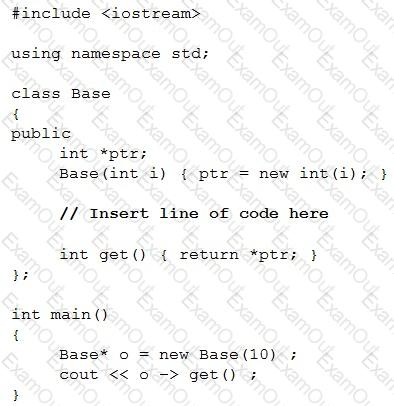Which code lines inserted independently instead of the comment will make the following program work correctly? (Choose three.)

Which of the following statements are true? (Choose two.)
What happens when you attempt to compile and run the following code?
#include
#include
using namespace std;
class A {
protected:
int y;
public:
int x, z;
A() : x(1), y(2), z(0) {}
A(int a, int b) : x(a), y(b) { z = x * y;}
void Print() { cout << z; }
};
class B : public A {
public:
int y;
B() : A() {}
B(int a, int b) : A(a,b) {}
void Print() { cout << z; }
};
int main () {
A b(2,5);
b.Print();
return 0;
}
What happens when you attempt to compile and run the following code?
#include
using namespace std;
int f(int a, int b);
int main()
{
float b;
b = f(20,10);
cout << b;
return 0;
}
int f(int a, int b)
{
return a/b;
}
How many times will the program print "HELLO" ?
#include
using namespace std;
int main()
{
cout<<"HELLO";
main();
return 0;
}
What happens when you attempt to compile and run the following code?
#include
using namespace std;
int fun(int x) {
return 2*x;
}
int main(){
int i;
i = fun(0.5) || fun(0);
cout << i;
return 0;
}
Which line of code inserted instead of the comment will make the following code run properly without causing memory leaks?

What happens when you attempt to compile and run the following code?
#include
using namespace std;
int mul (int a, int b=2)
{
int r;
r=a*b;
return (r);
}
int main ()
{
cout << mul(1) << mul(2,4);
return 0;
}
What will variable "y" be in class B?
class A {
int x;
protected:
int y;
public:
int age;
};
class B : public A {
string name;
public:
void Print() {
cout << name << age;
}
};
What happens when you attempt to compile and run the following code?
#include
#include
using namespace std;
class A {
protected:
int y;
public:
int x;
int z;
A() { x=1; y=2; z=3; }
A(int a, int b) : x(a), y(b) { z = x * y;}
void Print() {
cout << z;
}
};
int main () {
A a(2,5);
a.Print();
return 0;
}

